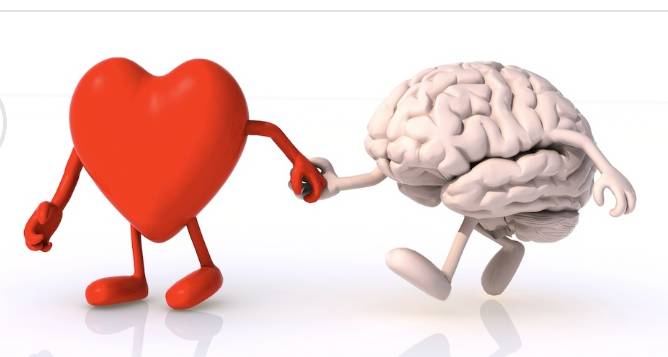Your guide to a better future
1. Nutrition
2. Fitness
3. Mental Health
Biology
Here's How Your Heart and Brain Work Together to Keep You Healthy
Your heart and brain health are dependent on each other. Here's what you need to know.
Your heart does more than just pump blood, and your brain does more than control what you think. As the two most important organs in the body, your heart and brain are in constant communication. It's a dynamic two-way street that's more complex than your heart pumping because your brain says so. Each organ significantly impacts how the other functions. Keeping your heart healthy can lower your risk of developing brain issues like dementia.
It's easier than you think to improve heart health. A few lifestyle changes can help you reduce stressors on your heart and brain and ultimately help you live a healthier life. Here's how.
How does your brain affect your heart?
Your brain has a direct pathway to your heart through the autonomic nervous system. The autonomic nervous system has two parts -- the sympathetic and parasympathetic nervous systems, which work in balance. Both sides play a key role in blood pressure and heart rate regulation.
By signing up, you agree to our Terms of Use and acknowledge the data practices in our Privacy Policy. You may unsubscribe at any time.
The sympathetic nervous system is our fight-or-flight response to danger or stress. When we're in stressful situations, the sympathetic system releases adrenaline, which will increase your heart rate and blood pressure accordingly. Conversely, the parasympathetic brings us back to a balanced, calm state that returns our heart rate and blood pressure to normal levels.
It wasn't until the 2004 InterHeart study that emotional stress was considered a significant risk factor for cardiac events. Your heart functioning can be altered by stress, and prolonged stressors can strain your heart.
An example of this would be Takotsubo cardiomyopathy, aka broken heart syndrome or stress-induced cardiomyopathy. This occurs when the left ventricle weakens and compromises proper function. It mimics the symptoms of a heart attack and generally happens after significant emotional or physical distress, like losing a loved one or a car accident.
Now, the sympathetic nervous system's natural and involuntary fight-or-flight response doesn't normally have lasting effects on a healthy person; it's chronically stressed hearts that are of concern, like people with coronary heart disease or existing heart problems.
How does your heart affect your brain?
Your heart is in charge of pumping oxygenated blood through the body, meaning your brain is completely reliant on your heart for the blood it needs. "The brain, even though by size is relatively small compared to the rest of the body, takes up about 20% of the overall blood oxygen levels and blood flow of the body," says Dr. Hardik P Amin, a Yale Medicine neurologist and assistant professor at Yale School of Medicine.
The cool thing about the heart and brain relationship is that your heart sends more information than it receives from the brain. The heart has the intrinsic cardiac nervous system, also known as the "heart-brain." It allows the heart to act independently from the brain, remember and make decisions. That means that under normal conditions, in which the heart is functioning correctly, your heart doesn't need your brain to tell it to do its job. It just does it.
If your heart is functioning properly, your risk of stroke and vascular dementia reduces. The problem arises when blood flow to the brain is compromised. One of the main ways this happens is through blood clots.
"Irregular heart rhythms like atrial fibrillation or atrial flutter can lead to blood clots developing in the chambers of the heart. Those blood clots can then travel up the arteries and can block a blood vessel downstream, blocking the blood flow to that part of the brain and can lead to a stroke. If the brain loses blood flow for a short period of time -- seconds or minutes -- that can lead to permanent damage," Amin says.
What you can do to reduce stressors on your heart and brain
1. Make lifestyle changes
If you want a healthy heart, you need a healthy brain and vice versa. Making lifestyle changes that improve cardiovascular health may contribute to your cognitive function and prevent future decline.
The key is to keep your blood pressure under control. High blood pressure puts pressure on blood vessels and can cause stroke or heart disease. Studies have shown that coronary heart disease is associated with long-term cognitive deterioration.
Lifestyle changes like quitting smoking or exercising will ensure that your blood flows like it should, keeping your heart and brain happy. It's also a good idea to limit your alcohol consumption as it's associated with heart failure and arrhythmias.
2. Practice mindfulness
If stress is your issue, eliminating those feelings can potentially improve biomarkers for cardiovascular health -- including inflammation, arterial stiffness and overall function.
Yoga and meditation are excellent options for reducing stress. People who practice meditation have less of the proinflammatory proteins, called cytokines. That means that it helps your heart manage stressors and helps your blood pressure and heart rate come back to normal.
Meditation might not be your answer. Maybe it's reading or just taking time to yourself and reflecting on your day. Whatever it is, the point is to avoid the fight-or-flight reaction and work through stress.
Keep in mind this is outside of diagnosed heart conditions. Meditation and breathing exercises can help lower your blood pressure and heart rate, but they will not remedy existing heart conditions.
3. Know your body
You know your body better than anyone. You know when things change or you feel off. It's crucial that you're mindful of heart symptoms you should watch for and when to bring them to the attention of your care team.
"If someone is developing a lot of shortness of breath with very minimal exertion, especially if they are just climbing up a couple of stairs or it becomes hard to breathe when they are lying down. That might be a sign of a heart problem," says Amin. "If they are starting to develop palpitations or they feel like their heart is racing with minimal activity or at rest, those are also signs of heart problems."
If you're diagnosed with heart troubles, you must keep up with your medically approved routine, including any prescription medication -- especially if you're on blood thinners, as even a brief interruption could increase the chances of having a stroke.
The heart-brain connection is a complicated and complex relationship that goes both ways: The proper function of either organ depends on the other. Thankfully, there are things that you can do to improve and maintain peak performance, as well as combat future issues. Lifestyle changes that help one will ultimately help the other -- like quitting smoking or regularly exercising.




No comments yet
Be the first to share your thoughts!